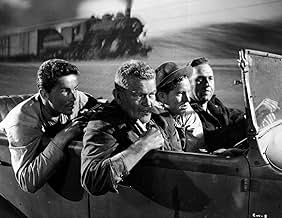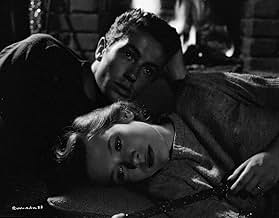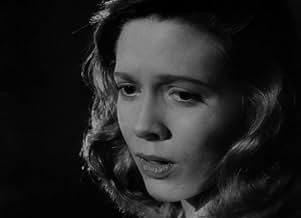IMDb RATING
7.4/10
10K
YOUR RATING
An escaped convict injured during a robbery falls in love with the woman who nurses him back to health, but their relationship seems doomed from the beginning.An escaped convict injured during a robbery falls in love with the woman who nurses him back to health, but their relationship seems doomed from the beginning.An escaped convict injured during a robbery falls in love with the woman who nurses him back to health, but their relationship seems doomed from the beginning.
- Director
- Writers
- Stars
- Director
- Writers
- All cast & crew
- Production, box office & more at IMDbPro
Featured reviews
This was the first pairing of Farley Granger and Cathy O'Donnell and it was successful enough so that the two worked together two years later in "Side Street. I heard that this movie was sort of a early "Bonnie and Clyde," and it was, but only to a degree.
Granger and O'Donnell didn't really dominate the screen until after 40 minutes but after that, it was mostly them. Frankly, I enjoyed the first 40 minutes best when Howard da Silva and J.C. Flippen shared the screen time. They were great film noir characters in this movie (and they did come back in the second half, livening up the film again.) I liked their names in here: da Silva was "Chicamaw." and Flippen was "T-Dub." In most of the second half of this movie, it went from a noir to a romance. but that's not surprising knowing the director was Nicholas Ray.
This is the best I've ever seen O'Donnell, who never impressed me much but she's impressive here with a fine performance and a nice '40s look to her. She had a strange character name, too: "Keechie." Granger ("Arthur Bowers") does a nice job, too. For an uneducated thug, he sure comes across as a really nice guy. It's kinda of weird. He reminded me of John Dall in "Gun Crazy" (1950). Some of the camera-work also reminded me of "Gun Crazy."
However, one major detail should be noted: unlike "Gun Crazy" and "Bonnie & Clyde," the two lovers in this movie did NOT rob banks together. O'Donnell's character never gets involved in any crime, so comparing this film to those doesn't really fit. Most of "Keechie's" time is spent living in a remote cabin lodge, and suggesting periodically to her husband that he go straight - a far cry from the women Peggy Cummins and Faye Dunaway played.
Like a lot of good film noirs, this also has some very good supporting actors who play weird people, and say weird things. Some of the dialogue in this movie is fascinating because it's so odd. One example is the guy who marries the couple for $20. Another is Keechie's father.
This is a odd little "B" noir/melodrama and definitely one that film noir fans should check out. Romantics will like it, too. I'm glad it is now available on disc, as part of the Film Noir Classics Collection Volume 4.
Granger and O'Donnell didn't really dominate the screen until after 40 minutes but after that, it was mostly them. Frankly, I enjoyed the first 40 minutes best when Howard da Silva and J.C. Flippen shared the screen time. They were great film noir characters in this movie (and they did come back in the second half, livening up the film again.) I liked their names in here: da Silva was "Chicamaw." and Flippen was "T-Dub." In most of the second half of this movie, it went from a noir to a romance. but that's not surprising knowing the director was Nicholas Ray.
This is the best I've ever seen O'Donnell, who never impressed me much but she's impressive here with a fine performance and a nice '40s look to her. She had a strange character name, too: "Keechie." Granger ("Arthur Bowers") does a nice job, too. For an uneducated thug, he sure comes across as a really nice guy. It's kinda of weird. He reminded me of John Dall in "Gun Crazy" (1950). Some of the camera-work also reminded me of "Gun Crazy."
However, one major detail should be noted: unlike "Gun Crazy" and "Bonnie & Clyde," the two lovers in this movie did NOT rob banks together. O'Donnell's character never gets involved in any crime, so comparing this film to those doesn't really fit. Most of "Keechie's" time is spent living in a remote cabin lodge, and suggesting periodically to her husband that he go straight - a far cry from the women Peggy Cummins and Faye Dunaway played.
Like a lot of good film noirs, this also has some very good supporting actors who play weird people, and say weird things. Some of the dialogue in this movie is fascinating because it's so odd. One example is the guy who marries the couple for $20. Another is Keechie's father.
This is a odd little "B" noir/melodrama and definitely one that film noir fans should check out. Romantics will like it, too. I'm glad it is now available on disc, as part of the Film Noir Classics Collection Volume 4.
A beautiful yet bleak movie about doomed young love on the run. The debut directorial feature of Nicholas Ray, it starts with three escaped prisoners on the run, roughing up the driver of a car they've hijacked after robbing a bank, two of them are seasoned old pros, but the third is a fresh-faced youngster imprisoned for a murder committed when he was a teenager. Although grateful for their springing him, he is resistant to their future plans to continue a life of crime. When they turn up at a safe house peopled by an old alcoholic friend and his young daughter, she makes clear her distaste for the three escapees. Tomboyish, with her hair up and dressed in overalls, she softens to the fresh-faced lad as she nurses him through an injury he's picked up on the road.
Soon they fall in love and decide to hit the road themselves, paying $20 dollars for a cut-price marriage but while they dream of carefree days ahead, in truth, they're always looking over their shoulders, fearing his discovery by the authorities, but when he's tracked down by his old cronies and forced into another bank job which goes wrong, his notoriety only increases and you just know his days are numbered.
Central to the film is the chemistry between its young stars Farley Granger and Cathy O'Donnell, as Bowie and Keechy, both completely natural in their roles. Production Code morality of the day ensures that Granger's Bowie character is duly punished for his misdemeanours but all the way you're rooting for the youngsters to somehow come through.
Starkly filmed by Ray, he ramps up the emotional tension as every time the couple find some solace and calm on their travels something happens to set them back. A last-ditch attempt to escape to Mexico only confirms Bowie's hopelessness at his and Keechy's prospects leaving just one final betrayal to seal his fate. Shot in atmospheric black and white with many imaginatively staged scenes alternating tenderness and fear, perhaps the most striking use of Ray's cameras are the helicopter shots looking down on the fleeing characters even as their journeys will take all of them nowhere.
Watching the film, I was reminded of another earlier noir classic about ill-fated young love, Fritz Lang's superb "You Only Live Once". Both are dark, driven, doomy pieces, memorable and highly recommended, just don't look for happy endings. Even the movies don't all end that way.
Soon they fall in love and decide to hit the road themselves, paying $20 dollars for a cut-price marriage but while they dream of carefree days ahead, in truth, they're always looking over their shoulders, fearing his discovery by the authorities, but when he's tracked down by his old cronies and forced into another bank job which goes wrong, his notoriety only increases and you just know his days are numbered.
Central to the film is the chemistry between its young stars Farley Granger and Cathy O'Donnell, as Bowie and Keechy, both completely natural in their roles. Production Code morality of the day ensures that Granger's Bowie character is duly punished for his misdemeanours but all the way you're rooting for the youngsters to somehow come through.
Starkly filmed by Ray, he ramps up the emotional tension as every time the couple find some solace and calm on their travels something happens to set them back. A last-ditch attempt to escape to Mexico only confirms Bowie's hopelessness at his and Keechy's prospects leaving just one final betrayal to seal his fate. Shot in atmospheric black and white with many imaginatively staged scenes alternating tenderness and fear, perhaps the most striking use of Ray's cameras are the helicopter shots looking down on the fleeing characters even as their journeys will take all of them nowhere.
Watching the film, I was reminded of another earlier noir classic about ill-fated young love, Fritz Lang's superb "You Only Live Once". Both are dark, driven, doomy pieces, memorable and highly recommended, just don't look for happy endings. Even the movies don't all end that way.
An early, nearly-forgotten picture from the director of "Rebel Without a Cause", this story of fugitive love (though not in the same was as "Bonnie and Clyde" or "Gun Crazy") is in its own right a rather accomplished picture.
Farley Granger is best remembered for his Hitchcock roles, and he gives a good, multifaceted performance. It's clear from the get-go that despite the company he keeps and despite his time in prison, he's really a scared, uncertain kid. Cathy O'Donnell is all but forgotten, but here gives a nearly Oscar-calibre performance, extremely convincing and appealing as his naive bride.
The film is also notable for early use of helicopter shots of cars, and for its refusal to vilify either the criminals or the cops (one of the policemen admits that "the system failed him", an astonishing statement for 1949).
All in all, a film which deserves to be resurrected from its obscurity.
Farley Granger is best remembered for his Hitchcock roles, and he gives a good, multifaceted performance. It's clear from the get-go that despite the company he keeps and despite his time in prison, he's really a scared, uncertain kid. Cathy O'Donnell is all but forgotten, but here gives a nearly Oscar-calibre performance, extremely convincing and appealing as his naive bride.
The film is also notable for early use of helicopter shots of cars, and for its refusal to vilify either the criminals or the cops (one of the policemen admits that "the system failed him", an astonishing statement for 1949).
All in all, a film which deserves to be resurrected from its obscurity.
Farley Granger plays Bowie, a young con who escapes from the pen with two hardened criminals, Chicamaw and T-Dub played respectively by Howard Da Silva and Jay C Flippen in They Live By Night, an aptly titled film if there ever was one. Da Silva and Flippen are both terrific here, as is Cathy O'Donnel as Keechie, Bowie's equally young girlfriend. The movie revolves around the relationship between them and their efforts to get away from the life of crime that is always a few steps behind them and also to try living like normal people, during the day, instead of at night, like their criminal associates. This was Nicholas Ray's first film as a director and it certainly was a worthy effort, as it has fine performances throughout, especially O'Donnels. As the film comes to a close, you can pretty well figure out the ending, but that doesn't detract from its potency, as they are let down by one of their own, blackmailed it seems by the cops.
Nicholas Ray's first film is a fascinating, enveloping example of a filmmaker getting as much as he can out of so little. His film was made under the radar at RKO, despite having John Houseman as a producer. While also having a cast of really unknowns, he also uses it to his advantage to tell a small story very well. It's close to being one of the more 'text-book' examples, in the story's core, in the history of B-noir (film-noir that didn't get the hype of The Big Sleep or Out of the Past, star vehicles as much as unique thrillers). Bowie (Farley Granger, soon to be a Hitchcock stock-player) escapes from jail with the help of a couple of bank robbers who make him, as they say, "an investment." He meets a girl, Keechie (Cathy O'Donnell), daughter of a farmer they pass by, and he becomes friends with her, so to speak. She agrees to leave town with him and they also decide, almost on a whim, to get married (for twenty bucks no less). But soon, very soon, fall in love, however, despite the checkered and now notorious past catching up to Bowie.
Obviously, if you're looking for stellar, "method" acting, look elsewhere in the main performances. But they do have enough of a pull in their chemistry on screen- sometimes rough and spelling of their doomed relationship, other times tragically tender- to back up the best aspects to the film. The true pleasures in seeing They Live By Night are the details that Ray lays in the scenes, bits of life probably taken from the book the movie's based on. Godard once proclaimed that Ray "IS cinema". If this statement does hold validity to a degree, it shows for certain even in Ray's debut in the scenes with the secondary platers. Such as the wedding scene, or in general with the dialog in the script (i.e. "Between him and the chicken, I'd bet on the chicken", or "I'm the black sheep" "the only thing black about you are your eyelashes), or even with the strengths in Ray's camera as a simple storyteller. In a sense this cuts right to the chase with the theme of doomed youth, years before Rebel Without a Cause yet with the given desperation of the noir films.
While generally less seen than Ray's other films (though more attributable to being less available on video), it's likely one of his best; a powerful mix of the bittersweet tale of a criminal and his love that would decades later meld with other crime-film elements into a work like True Romance.
Obviously, if you're looking for stellar, "method" acting, look elsewhere in the main performances. But they do have enough of a pull in their chemistry on screen- sometimes rough and spelling of their doomed relationship, other times tragically tender- to back up the best aspects to the film. The true pleasures in seeing They Live By Night are the details that Ray lays in the scenes, bits of life probably taken from the book the movie's based on. Godard once proclaimed that Ray "IS cinema". If this statement does hold validity to a degree, it shows for certain even in Ray's debut in the scenes with the secondary platers. Such as the wedding scene, or in general with the dialog in the script (i.e. "Between him and the chicken, I'd bet on the chicken", or "I'm the black sheep" "the only thing black about you are your eyelashes), or even with the strengths in Ray's camera as a simple storyteller. In a sense this cuts right to the chase with the theme of doomed youth, years before Rebel Without a Cause yet with the given desperation of the noir films.
While generally less seen than Ray's other films (though more attributable to being less available on video), it's likely one of his best; a powerful mix of the bittersweet tale of a criminal and his love that would decades later meld with other crime-film elements into a work like True Romance.
Did you know
- TriviaThe opening helicopter shot was the first scene that Nicholas Ray ever directed.
- GoofsThe new Cadillac is seen to be covered with a tarpaulin. When the camera swings back to it, the tarpaulin has vanished.
- Crazy creditsOpening credits: This boy . . . and this girl . . . were never properly introduced to the world we live in . . . To tell their story . . .
- ConnectionsEdited into Histoire(s) du cinéma: Le contrôle de l'univers (1999)
- SoundtracksYour Red Wagon
by Richard M. Jones, Don Raye and Gene de Paul (as Gene DePaul)
Performed by Marie Bryant (uncredited)
[Sung by club performer]
- How long is They Live by Night?Powered by Alexa
Details
- Release date
- Country of origin
- Language
- Also known as
- Los amantes de la noche
- Filming locations
- Production company
- See more company credits at IMDbPro
Box office
- Budget
- $808,397 (estimated)
- Runtime1 hour 35 minutes
- Color
- Aspect ratio
- 1.37 : 1
Contribute to this page
Suggest an edit or add missing content







































